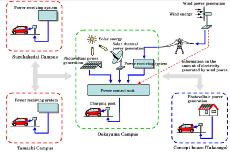Mitsubishi Corp and the Tokyo Institute of Technology have announced that they will cooperate on the development of infrastructure systems for charging electric vehicles with renewable energy.
To reduce the consumption of thermal and atomic power, the two parties plan to develop a system to charge electric vehicles with power generated by renewable energy such as sunlight, solar heat and wind power. And they aim to establish an infrastructure system that can reduce the total environmental load from the time of power generation to the time of driving.
In the field test, photovoltaic panels, a solar thermal power generator, a power receiving system for electricity generated by wind power, a power control system and a charging post will be installed on the Ohokayama Campus of the Tokyo Institute of Technology. The charging posts are also installed on Suzukakedai and Tamachi Campuses. The "i-MiEV" electric vehicle prototyped by Mitsubishi Motors Corp will be running between the campuses.
In addition, a concept house with photovoltaic panels and a charging post, simulating the house of an electric vehicle user, will be built in Takasago and the i-MiEV will run between the concept house and the Ohokayama Campus.
A dish generator will be used for solar thermal power generation. In a dish generator, a receiver located in the center collects sunlight reflected by a curved mirror (dish), and power is generated by using a Stirling engine, which has a high theoretical power generation efficiency. A power storage system will also be required because power generation by sunlight and solar heat are only available during the day.
Further, less expensive nighttime power provided by power companies will be stored and controlled by the power control system so that low-cost power with less environmental load can be supplied as needed.
The amount of electricity generated by wind power cannot be controlled in accordance with power demand. Thus, Mitsubishi and the Tokyo Institute of Technology are now developing a system to transmit data on the amount of electricity generated by a remote wind power generator to the power control system, so that charging is available only when electricity is generated by wind power.
The field test will be conducted from July 1, 2008, to March 31, 2010, as part of the Advanced Energy Management (AEM) project promoted by the Integrated Research Institute of the Tokyo Institute of Technology. It is supported by GS Yuasa Power Supply Ltd. Eyeful Home, an affiliate of Tostem Housing Institute Co Ltd, will participate in the research on the concept house.

